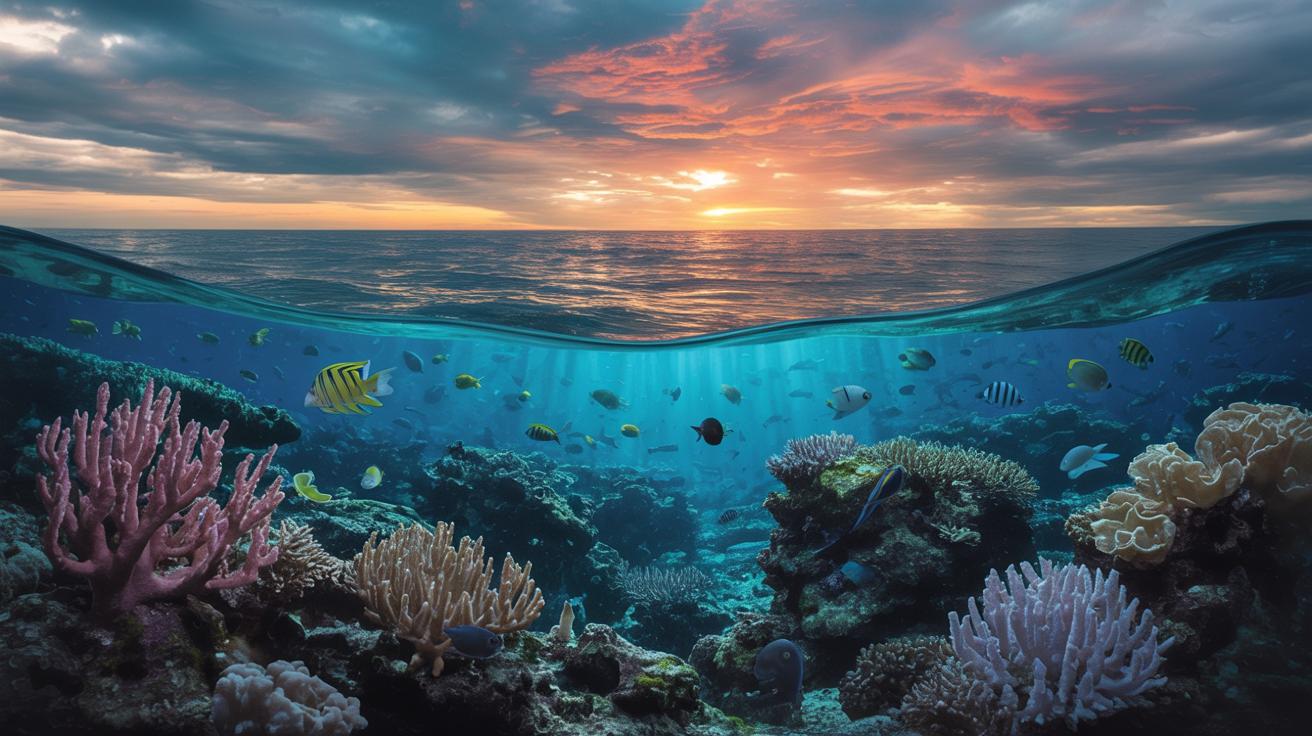What You Need to Know
- 🌊 Vast Marine Heatwave: In 2024, a marine heatwave engulfed an area of nearly 15 million square miles, five times the size of Australia.
- 📈 Rising Sea Levels: Affected regions experienced sea level rises at approximately 0.16 inches per year, surpassing the global average.
- 🐠 Threatened Ecosystems: The extreme ocean temperatures have caused severe stress and damage to marine life, leading to widespread coral bleaching and biodiversity loss.
- 💰 Economic Impact: Coastal communities and island nations face significant economic challenges, with the Philippines alone suffering $430 million in damage from increased tropical cyclones.
- 🛑 Urgent Climate Action Needed: The heatwave underscores the critical need for global efforts to address climate change and implement sustainable development practices.
The world is witnessing one of the most alarming environmental crises in recent history. In 2024, a marine heatwave engulfed an area of ocean nearly 15 million square miles, five times the size of Australia. This extraordinary event has raised significant concerns among scientists and environmentalists about the future of marine ecosystems and the economic impact on the regions affected. The World Meteorological Organization (WMO) has provided a comprehensive report on this unprecedented phenomenon, linking it to the broader climate crisis and coinciding with a series of extreme weather events across Southeast Asia and the Pacific.
Record-Breaking Ocean Heatwave
The marine heatwave that struck in 2024 was unprecedented in its scale and intensity. Covering an area nearly 15 million square miles, it represents a significant deviation from historical temperature norms. According to the WMO, this heatwave is a stark indicator of the ongoing climate crisis, with ocean temperatures soaring to levels never before recorded. The heatwave coincided with a multitude of extreme weather events, including deadly landslides in the Philippines and major flooding in Australia. These events have underscored the urgent need for stronger climate action to address the underlying causes of such extreme conditions.
Satellite data has shown that sea levels are rising at an alarming rate of approximately 0.16 inches per year in the affected regions. This is significantly higher than the global average of 0.14 inches per year, exacerbating the threat to coastal communities and ecosystems. The rising temperatures have also contributed to the fifth mass coral bleaching event across Australia’s Great Barrier Reef since 2016, leading to widespread coral death and further endangering marine biodiversity.
Impact on Marine Ecosystems
The impact of the marine heatwave on ecosystems has been devastating. The extreme heat has inflicted long-lasting damage on marine life, with many organisms unable to survive in such elevated temperatures. The WMO’s report highlights the severe stress placed on marine species, many of which have temperature thresholds that, when exceeded, lead to organism failure, migration, or death. This disruption to marine life has cascading effects on the entire ecosystem, threatening biodiversity and food chains.
The heatwave has also accelerated ocean acidification, compounding the challenges faced by marine organisms. Acidification affects the ability of shell-forming species to maintain their shells, potentially leading to a decline in populations of vital species such as mollusks and crustaceans. The loss of these species can have dire consequences for marine ecosystems and the human communities that depend on them for sustenance and economic activity.
Economic Ramifications
The economic impact of the marine heatwave cannot be overstated. Coastal regions and island nations heavily rely on marine resources for their livelihoods. The destruction of marine ecosystems disrupts fishing industries, tourism, and other economic activities. The WMO report estimates that the Philippines alone suffered damage worth $430 million due to an unprecedented number of tropical cyclones.
In Southeast Asia and the Pacific, the heatwave has led to significant displacement and loss of life. Major flooding in Singapore and Malaysia displaced over 137,000 people, while extreme rainfall and landslides in the Philippines resulted in the deaths of at least 93 individuals. These events highlight the urgent need for adaptive strategies and robust infrastructure to mitigate the impact of climate-related disasters on vulnerable populations.
A Call for Climate Action
The findings of the WMO report serve as a clarion call for urgent climate action. The dramatic rise in ocean temperatures and the resulting environmental and economic impacts underscore the necessity of addressing the root causes of climate change. Scientists like Assoc Prof Alex Sen Gupta have emphasized the need for comprehensive research to better understand the factors contributing to such dramatic temperature increases.
As the world grapples with the consequences of climate change, it becomes increasingly evident that time is of the essence. The global community must come together to implement effective policies and practices to reduce greenhouse gas emissions and promote sustainable development. Only through concerted efforts can we hope to curb the trajectory of climate change and safeguard the future of our planet.
The 2024 marine heatwave serves as a stark reminder of the fragility of our planet’s ecosystems and the urgent need for action. As we confront the challenges posed by a changing climate, we must ask ourselves: What steps will we take individually and collectively to ensure a sustainable future for generations to come?
Did you like it?4.4/5 (25)







12 comments
adeline
It’s time we all reduce our carbon footprints. Let’s save our oceans! 😊
Charlie_Illumination
With sea levels rising, do you think we’ll see more climate refugees from island nations?
Addison
Thanks for the detailed report. How can policymakers use this data to prevent future disasters?
Charlotte_Legend
Who else feels like Mother Nature is sending us a big wake-up call? We better listen before it’s too late.
theodore
People should start taking climate change seriously. We need global action NOW!
Emily_Radiance
I’m curious, how does this marine heatwave compare to previous ones we’ve experienced?
Jason
Oceans on fire?! 😱 That’s one way to make a splash! But seriously, this is alarming news.
GenesisSentinel
Is there any hope for the Great Barrier Reef after this heatwave? Can coral reefs recover from such events?
Paisley2
Great article, thanks for sharing! It’s crucial to stay informed about our planet’s health.
Aaron
Oh no, not the fishies! Seriously though, how does this affect local fishing communities?
evelyn
This is really concerning. The economic impact alone is mind-boggling. Are there any recovery plans in place for the affected regions?
owen7
Wow, 40 million square miles affected? That’s terrifying! What can we do as individuals to help combat this crisis? 🌊